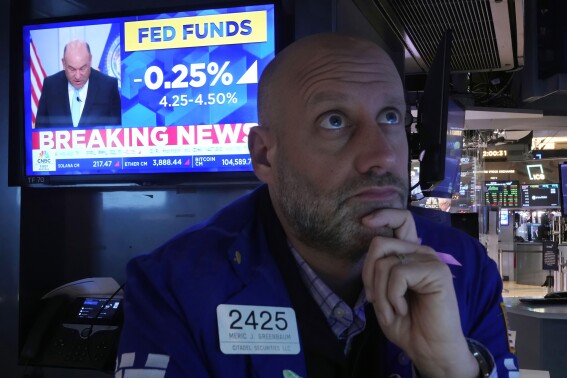BANGKOK (AP) — Shares skidded Thursday in Asia after U.S. stocks tumbled to one of their worst days of the year when the Federal Reserve hinted it may deliver fewer rate cuts in 2025 than earlier thought.
The Fed cut its key rate by a quarter of a percentage point to between 4.25% and 4.5%, as expected. Other major central banks have stood pat this week, with the Bank of Japan opting Thursday to keep its benchmark rate at 0.25%. That decision, which was expected, pushed the dollar higher against the Japanese yen.
Asian markets fell, but generally by less than 2%, with Tokyo’s Nikkei 225 falling 0.7% to 38,806.70. The dollar was trading at 155.24 yen by midday Thursday, up from 154.79 yen.
A weaker yen tends to push prices higher in Japan, which depends heavily on imports, and that in turn raises pressure on the Bank of Japan to raise rates. Analysts say they expect a BOJ rate hike in January, but also that the central bank is wary of big changes as it waits to see possible shocks from President-elect Donald Trump’s policies on tariffs.
There are “high uncertainties” surrounding Japan’s business outlook and prices and developments in foreign economies and commodity prices, the BOJ said in a statement.
Chinese markets also declined. The Hang Seng index fell 1% to 19,666.12, while the Shanghai Composite index dropped 0.7% to 3,357.82.
Australia’s S&P/ASX 200 shed 1.9% to 8,153.80, while the Kospi in South Korea slipped 1.5% to 2,447.17. India’s Sensex fell 0.9%.
In Taiwan, the Taiex lost 1.5%, while Bangkok’s SET fell 0.6%.
On Wednesday, the S&P 500 fell 2.9%, just shy of its biggest loss for the year, to close at 5,872.16. The Dow Jones Industrial Average lost 1,123 points, or 2.6%, to 42,326.87, and the Nasdaq composite dropped 3.6% to 19,392.69.
The Russell 2000 index of small-cap stocks tumbled 4.4%.
Wednesday’s rate cut is the third this year after it began in September to lower rates from a two-decade high to support the job market. Wall Street loves easier interest rates, but the cut was already widely expected and investors were more focused on how much more the Fed will cut next year.
A lot is riding on it, particularly after expectations for a series of cuts in 2025 helped the U.S. stock market set an all-time high 57 times so far in 2024.
Fed officials released projections on Wednesday showing the median expectation among them is for two more cuts to the federal funds rate in 2025, or half a percentage point’s worth. That’s down from the four cuts expected just three months ago.
“We are in a new phase of the process,” Fed Chair Jerome Powell said.
Asked why Fed officials are looking to slow their cuts, he pointed to how well the job market is performing overall and how recent inflation readings have picked up.
Powell said some Fed officials, but not all, are also already trying to incorporate uncertainties inherent in a new administration coming into the White House. Worries are rising on Wall Street that President-elect Donald Trump’s preference for tariffs and other policies could further fuel inflation.
“When the path is uncertain, you go a little slower,” Powell said. It’s “not unlike driving on a foggy night or walking into a dark room full of furniture. You just slow down.”
The reduced expectations for 2025 rate cuts sent Treasury yields higher, squeezing the stock market.
The yield on the 10-year Treasury rose to 4.51% from 4.40% late Tuesday, which is a notable move for the bond market. The two-year yield, which more closely tracks expectations for Fed action, climbed to 4.35% from 4.25%.
Nvidia, the superstar stock responsible for a chunk of Wall Street’s rally to records in recent years, fell 1.1% to extend its weekslong funk. It has dropped more than 13% from its record set last month and fallen in nine of the last 10 days as its big momentum slows.
In other dealings early Thursday, U.S. benchmark crude oil gave up 41 cents to $69.61 per barrel in electronic trading on the New York Mercantile Exchange. Brent crude, the international standard, fell 39 cents to $73.00 per barrel.
The euro rose to $1.0377 from $1.0355.
Based in Bangkok, Kurtenbach is the AP’s business editor for Asia, helping to improve and expand our coverage of regional economies, climate change and the transition toward carbon-free energy. She has been covering economic, social, environmental and political trends in China, Japan and Southeast Asia throughout her career.
